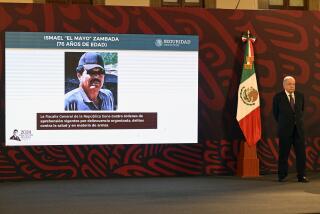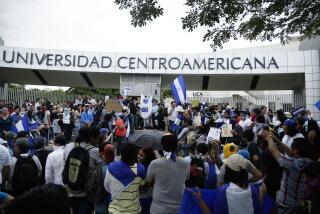Downed Plane Not Ours, Shultz Says : But Crewmen Termed Heroes by U.S. Official
- Share via
WASHINGTON — The Reagan Administration said Tuesday that an American-manned cargo airplane that crashed in Nicaragua was sponsored by a private group, not the U.S. government, but a senior official lauded its crewmen as “heroes” who had helped Nicaraguan rebels survive a cutoff in U.S. aid.
The State Department, Defense Department and CIA issued categorical denials that the plane, which crashed in Nicaragua on Sunday, was owned, financed or sponsored by the U.S. government.
The Nicaraguan government said Monday that its forces shot down the plane, killing three crew members, and then captured an American, identified as Eugene Hasenfus, at the crash site, 91 miles southeast of Managua, near the Costa Rican border.
“It was, (from) all we know, a plane hired by private people, apparently some of them American,” Secretary of State George P. Shultz said. “They had no connection with the U.S. government at all.”
Twin-Engine Plane
The Nicaraguan Defense Ministry said that the camouflaged, twin-engine airplane, believed to be a C-123 cargo plane, was carrying 50,000 rounds of ammunition for Soviet-made AK-47 rifles, rocket-propelled grenades, dozens of automatic rifles, jungle boots and other military supplies for the U.S.-backed rebels, called contras, who are trying to oust the leftist Sandinista government of Nicaragua.
Hasenfus identified himself as a U.S. military adviser based in El Salvador, according to a statement released by Nicaragua.
Alejandro Bendana, Foreign Ministry secretary general, charged Tuesday that the plane was “on a CIA operation with CIA operatives.”
But U.S. officials denied that Hasenfus, 45, a former Marine and unemployed steelworker from Marinette, Wis., worked for any agency of the U.S. government.
“The guy doesn’t work for us, and CIA is not involved,” CIA spokesman Kathy Pherson said. “There are congressional restrictions on assistance to the contras, and we do not break those restrictions.”
Lt. Col. Arnie Williams, a Pentagon spokesman, said the Defense Department could not confirm that the man being held by the Nicaraguans was Eugene Hasenfus. But Williams said that a man by that name had served as a Marine.
Earlier, Capt. Jay Farrar, another Pentagon spokesman, said the Pentagon has “no record of missing U.S. military personnel or aircraft in Central America.”
‘No Relation With Us’
U.S. Embassy spokesman Pendleton Agnew in San Salvador, the capital of El Salvador, said the survivor “is not an adviser, not an employee of the embassy and has no relation with us.”
Nicaraguan rebel sources Tuesday confirmed that the plane had been carrying supplies for their troops. One rebel official said the plane was delivering weapons for the largest contra group, the Nicaraguan Democratic Force, but a spokesman for that group said he could not confirm the report.
“It would be premature to draw any conclusion about this plane,” the spokesman, Bosco Matamoros, said.
Assistant Secretary of State Elliott Abrams said the U.S. government is aware of who organized the supply flight but refused to identify the sponsors.
However, Abrams made it clear that private groups have been flying weapons and supplies to the contras with the explicit blessings of the Administration.
“What’s kept the resistance alive has been private help,” he said, noting that Congress halted U.S. military assistance to the contras in 1984.
“Some very, very brave people have been willing to actually bring this material into Nicaragua, as seems to be the case with this flight,” Abrams said. “All I can say about the people who were on it . . . is God bless them, because they were fighting for freedom in Central America and keeping the option alive while Congress made up its mind.”
Both houses of Congress have voted to give the contras $100 million in aid, but the overall appropriation bill containing the money has not been given final approval.
Abrams said that he and other officials have met with the leaders of private groups organizing supply flights to the contras and expressed to them “a lot of appreciation.”
“I think it’s wonderful that Americans, private citizens, are willing to contribute . . . but the real heroes of this are those who took risks to get the material delivered,” he said. “They’re heroes.”
‘It Would Be Rather Odd’
In the past, the Administration had publicly denied reports that it helped organize the private aid network that sprang up to support the contras after Congress halted U.S. government aid. Abrams stopped short of acknowledging that the Administration actively encouraged the groups but said, “It would be rather odd for us to be discouraging them.”
The chairman and vice chairman of the Senate Intelligence Committee said they accepted the CIA’s assurances that it was not involved in the supply flight but added that they are concerned about the Administration’s tacit encouragement of private efforts.
“It will bother me if this turns out to be connected with adjunct soldiers of fortune sent out there with a wink and nod or a shrug as a way of getting around our foreign policy or the law,” Sen. Patrick J. Leahy (D-Vt.), vice chairman of the committee, said. “Then we’ll have serious trouble conducting our foreign policy down there. Those people should know that they damage U.S. policy more than help it.”
‘Credit Card’ for War
“I share the concern that, once you issue a credit card for so-called freedom fighting, you get a lot of people who want to use it,” said Sen. Dave Durenberger (R-Minn.), the panel’s chairman.
Several private groups that have provided supplies to the contras in the past denied any connection to this flight.
Retired Lt. Gen. John K. Singlaub, the most public of the contras’ U.S. fund-raisers, acknowledged through a spokeswoman that he has organized supply flights in the past. “But he says this isn’t one of his,” Terry Swofford said.
Alexander M. S. McColl, who has organized private aid to the contras on behalf of Soldier of Fortune magazine, said, “All we know about this incident is what we read in the papers.”
Denial From Aid Group
A spokesman for Civilian Material Assistance, a group that once sent U.S. trainers into battle with the contras, said it had no connection to the flight either. Two members of the group, then called Civilian Military Assistance, were killed when their CIA-supplied helicopter was shot down inside Nicaragua by Sandinista troops in September, 1984.
In January of that year, a U.S. Army pilot, Chief Warrant Officer Jeffrey C. Schwab of Joliet, Ill., was killed by Sandinista fire after his helicopter crossed into Nicaraguan airspace.
More to Read
Sign up for Essential California
The most important California stories and recommendations in your inbox every morning.
You may occasionally receive promotional content from the Los Angeles Times.













